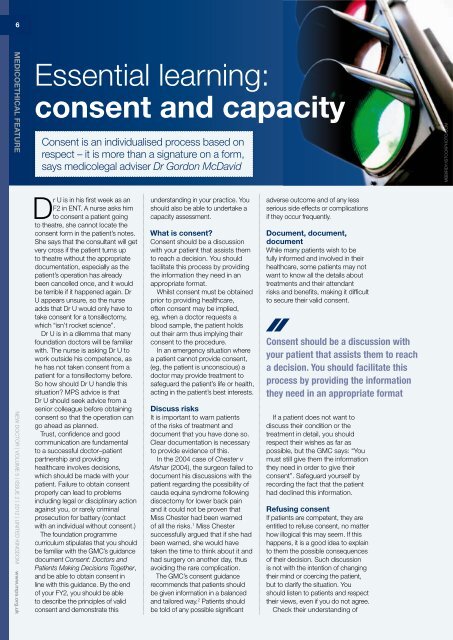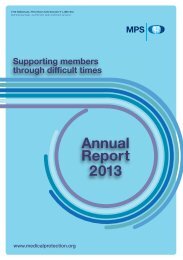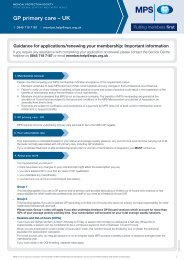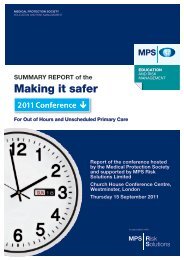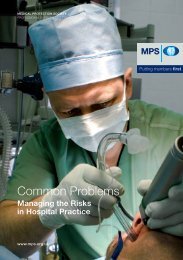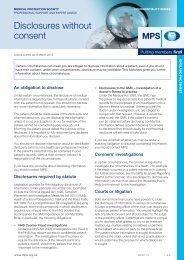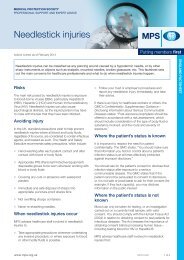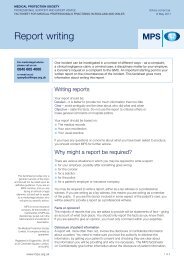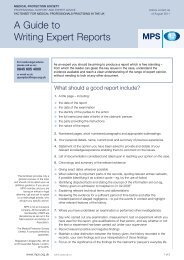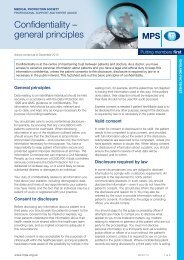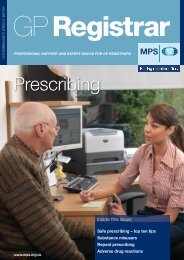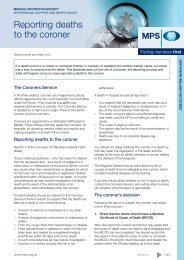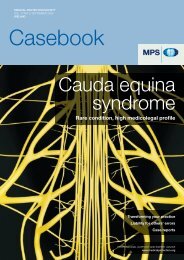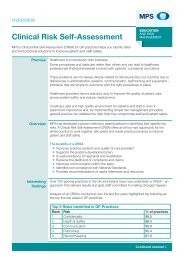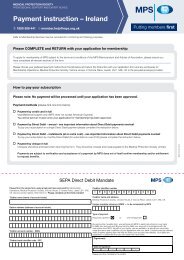New Doctor - Medical Protection Society
New Doctor - Medical Protection Society
New Doctor - Medical Protection Society
You also want an ePaper? Increase the reach of your titles
YUMPU automatically turns print PDFs into web optimized ePapers that Google loves.
6<br />
MEDICOETHICAL FEATURE<br />
NEW DOCTOR | VOLUME 5 | ISSUE 2 | 2012 | UNITED KINGDOM www.mps.org.uk<br />
Essential learning:<br />
consent and capacity<br />
Consent is an individualised process based on<br />
respect – it is more than a signature on a form,<br />
says medicolegal adviser Dr Gordon McDavid<br />
Dr U is in his first week as an<br />
F2 in ENT. A nurse asks him<br />
to consent a patient going<br />
to theatre, she cannot locate the<br />
consent form in the patient’s notes.<br />
She says that the consultant will get<br />
very cross if the patient turns up<br />
to theatre without the appropriate<br />
documentation, especially as the<br />
patient’s operation has already<br />
been cancelled once, and it would<br />
be terrible if it happened again. Dr<br />
U appears unsure, so the nurse<br />
adds that Dr U would only have to<br />
take consent for a tonsillectomy,<br />
which “isn’t rocket science”.<br />
Dr U is in a dilemma that many<br />
foundation doctors will be familiar<br />
with. The nurse is asking Dr U to<br />
work outside his competence, as<br />
he has not taken consent from a<br />
patient for a tonsillectomy before.<br />
So how should Dr U handle this<br />
situation? MPS advice is that<br />
Dr U should seek advice from a<br />
senior colleague before obtaining<br />
consent so that the operation can<br />
go ahead as planned.<br />
Trust, confidence and good<br />
communication are fundamental<br />
to a successful doctor–patient<br />
partnership and providing<br />
healthcare involves decisions,<br />
which should be made with your<br />
patient. Failure to obtain consent<br />
properly can lead to problems<br />
including legal or disciplinary action<br />
against you, or rarely criminal<br />
prosecution for battery (contact<br />
with an individual without consent.)<br />
The foundation programme<br />
curriculum stipulates that you should<br />
be familiar with the GMC’s guidance<br />
document Consent: <strong>Doctor</strong>s and<br />
Patients Making Decisions Together,<br />
and be able to obtain consent in<br />
line with this guidance. By the end<br />
of your FY2, you should be able<br />
to describe the principles of valid<br />
consent and demonstrate this<br />
understanding in your practice. You<br />
should also be able to undertake a<br />
capacity assessment.<br />
What is consent?<br />
Consent should be a discussion<br />
with your patient that assists them<br />
to reach a decision. You should<br />
facilitate this process by providing<br />
the information they need in an<br />
appropriate format.<br />
Whilst consent must be obtained<br />
prior to providing healthcare,<br />
often consent may be implied,<br />
eg, when a doctor requests a<br />
blood sample, the patient holds<br />
out their arm thus implying their<br />
consent to the procedure.<br />
In an emergency situation where<br />
a patient cannot provide consent,<br />
(eg, the patient is unconscious) a<br />
doctor may provide treatment to<br />
safeguard the patient’s life or health,<br />
acting in the patient’s best interests.<br />
Discuss risks<br />
It is important to warn patients<br />
of the risks of treatment and<br />
document that you have done so.<br />
Clear documentation is necessary<br />
to provide evidence of this.<br />
In the 2004 case of Chester v<br />
Afshar (2004), the surgeon failed to<br />
document his discussions with the<br />
patient regarding the possibility of<br />
cauda equina syndrome following<br />
discectomy for lower back pain<br />
and it could not be proven that<br />
Miss Chester had been warned<br />
of all the risks. 1 Miss Chester<br />
successfully argued that if she had<br />
been warned, she would have<br />
taken the time to think about it and<br />
had surgery on another day, thus<br />
avoiding the rare complication.<br />
The GMC’s consent guidance<br />
recommends that patients should<br />
be given information in a balanced<br />
and tailored way. 2 Patients should<br />
be told of any possible significant<br />
adverse outcome and of any less<br />
serious side effects or complications<br />
if they occur frequently.<br />
Document, document,<br />
document<br />
While many patients wish to be<br />
fully informed and involved in their<br />
healthcare, some patients may not<br />
want to know all the details about<br />
treatments and their attendant<br />
risks and benefits, making it difficult<br />
to secure their valid consent.<br />
Consent should be a discussion with<br />
your patient that assists them to reach<br />
a decision. You should facilitate this<br />
process by providing the information<br />
they need in an appropriate format<br />
If a patient does not want to<br />
discuss their condition or the<br />
treatment in detail, you should<br />
respect their wishes as far as<br />
possible, but the GMC says: “You<br />
must still give them the information<br />
they need in order to give their<br />
consent”. Safeguard yourself by<br />
recording the fact that the patient<br />
had declined this information.<br />
Refusing consent<br />
If patients are competent, they are<br />
entitled to refuse consent, no matter<br />
how illogical this may seem. If this<br />
happens, it is a good idea to explain<br />
to them the possible consequences<br />
of their decision. Such discussion<br />
is not with the intention of changing<br />
their mind or coercing the patient,<br />
but to clarify the situation. You<br />
should listen to patients and respect<br />
their views, even if you do not agree.<br />
Check their understanding of<br />
MBBIRDY/ISTOCKPHOTO.COM


